
Battling a hungry beetle, this Mohawk community hopes to keep its trees — and traditions — alive
An invasive pest threatens the survival of black ash trees — and the Mohawk art...
David Piccini wants you to trust him.
The dapper first-term MPP has spent his six months as Ontario’s environment minister parrying blows left and right over unpopular decisions made by Doug Ford’s government in areas such as development and clean energy. In another few months, he’ll be doing his best to win over voters for whom climate matters more than ever. It’s not a simple task.
In recent memory, conservative strategists have approached the environment as a shield issue — an area where Tories can’t easily win, but must be able to mount a credible defence if they want a path to victory. Piccini wants to make it a sword issue instead, one the Progressive Conservatives can wield to beat their opponents.
“Whether that will be achieved in a matter of weeks, months or years … ultimately, my actions will speak louder than my words,” he says. “At its core, I think that’s my job.”
Piccini is known as a charming, kind go-getter who’s as good at managing stakeholders as he is at going to bat for his party. At 33, he’s the youngest minister to lead the environment portfolio. He’s garnered praise from old and young Tories alike, and found friends across the aisle. Even critics say they’ve found common ground with him.
That might explain why Premier Ford chose Piccini to take on one of his government’s weakest portfolios — with responsibilities like cutting emissions and protecting endangered species, both areas where Ontario’s auditor general just gave the Tories a failing grade — at a moment where climate has taken on added importance. After a year of extreme weather and wildfires, Ontarians are almost as worried about climate change as they are about inflation and COVID-19, according to a Nanos/CTV poll of 1,010 Canadians published in December 2021.
“He’s a hustler, and I think he gets how to build a modern, inclusive conservative movement, and he gets that environmentalism has to be a huge part of this equation,” says Jeff Ballingall, the founder of right-wing advocacy groups Ontario Proud and Canada Proud, who calls Piccini a “buddy.”
“When you combine that with someone that’s compassionate, and empathetic, and with his work ethic, it’s a very, very powerful force.”
Critics, however, question whether that enthusiasm and acumen will translate into real progress within a government that has so far focused on environmental deregulation over preservation. And Piccini consistently maintains that a crucial plank of his strategy is balancing environmental concerns with the economic considerations of emitting industries.

“It’s very hard to see how the government is going to fix its reputation without acknowledging that the initiatives that it took over the first three years were a mistake,” says Phil Pothen, Ontario programs manager at Environmental Defence. He points to the province’s weakening of conservation authorities, and the numerous permits it has issued to companies seeking to build on endangered species habitat.
“I hope it’s true [that Piccini] has at least some personal inclination to try and do the right thing … To be frank, we’re not aware of any initiatives that are at all that positive,” Pothen says.
Sitting in the Environment Ministry’s Bay Street office, with his dog Max asleep at his feet and a whiteboard full of to-dos across the room, Piccini says he doesn’t believe the province can legislate its way to a climate-friendly economy. He wants to cut emissions by investing in transit and advancing technology to help industries like auto and steel get cleaner.
Though he defends his government’s past moves on the environment — and current controversial plans, such as those to build two highways through the Greenbelt — he also asks critics to look at what he’s doing now.
“Don’t hold me to things that were 2018, ‘19, two years ago. That was a snapshot in time,” he says.
“If you could say ‘You have made no announceables, you have done nothing,’ then fair criticism. But I can point tangibly … to massive announcements.”
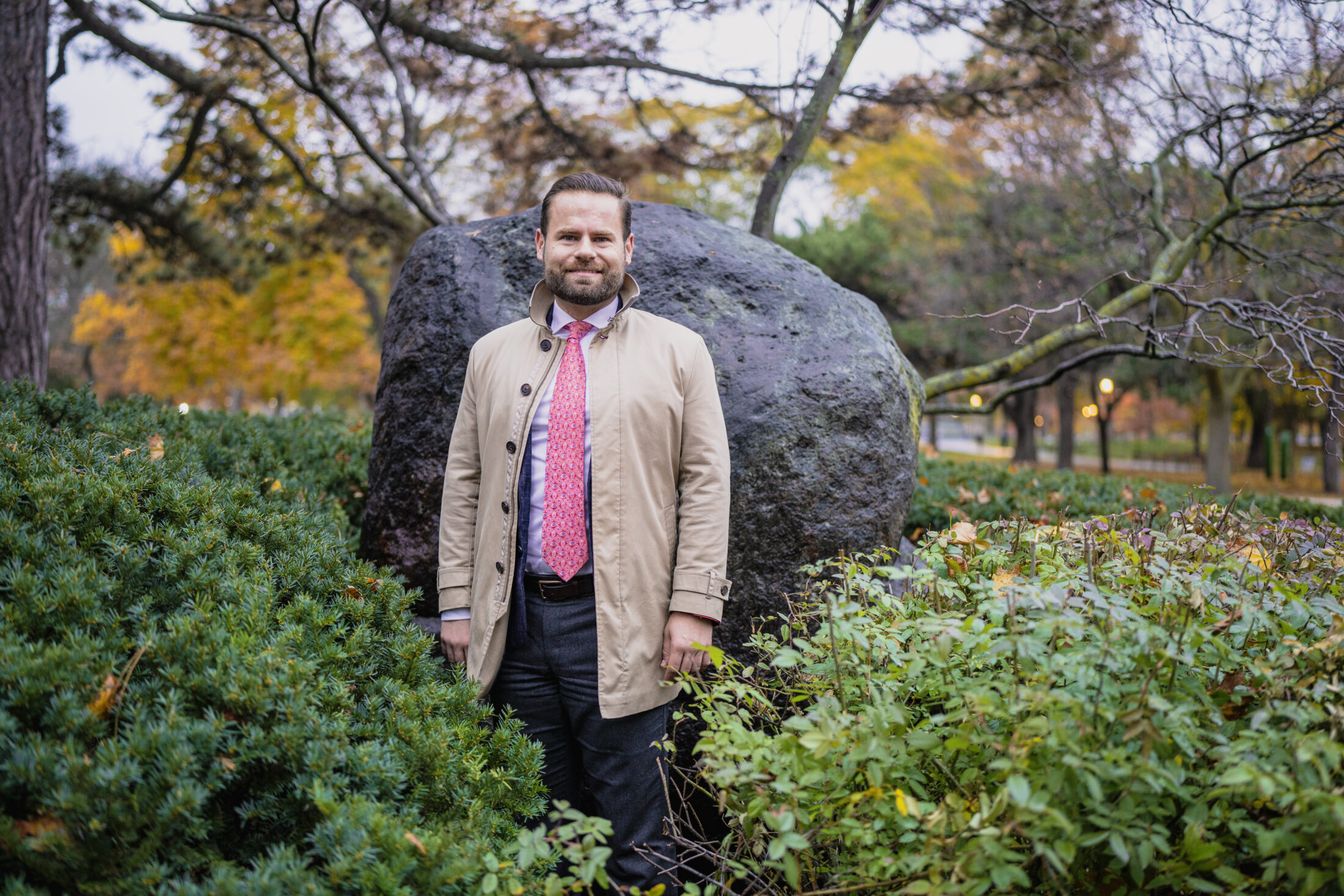
Piccini grew up in Port Hope, a community a little over an hour east of Toronto, nestled along the north shore of Lake Ontario in his riding of Northumberland—Peterborough South. His father is an architect. Before his mother retired in 2018, she was an educator at Trinity College School, an independent non-denominational school with Anglican roots: Piccini, his sister and his fiancée are all alumni.
His grandfather was born on a farm in Udine, in Northern Italy — the home of Piccini’s favourite soccer team, Udinese Calcio. According to family lore, he migrated to Canada with no money, carving out a life here with a job at Stelco in Hamilton. It’s a bootstraps narrative that Piccini draws on when explaining why his concern for the climate doesn’t allow for risking industrial jobs — his idea of a just transition involves making heavy emitters sustainable, not phasing them out in favour of greener economies.
When it comes to phasing out plastics, or scaling up recycling, for example, the environment minister says he would rather make those changes by supporting the private sector as it attempts to innovate and get cleaner.
“This idea that the government can regulate and legislate its way to net zero or to combat climate change is an absolute fallacy,” he says in early December. “[The loss of] good manufacturing jobs, men and women like my grandfather put out of work … does not get us to net zero, it doesn’t get us to a better planet, it gets us to misery and poverty, and I refuse to allow that to happen.”


Growing up, Piccini says his family included Conservatives, Liberals and Greens, but his interest in politics didn’t start until university, where he studied political science and history. “I was never a tiny Tory,” he says. He played soccer at the University of Ottawa, later coaching the team, and was on the History Students Association. He felt himself lean towards the right when he became disillusioned with student government and what he saw as a lack of free speech.
In 2010, amid a firestorm over a cancelled speech by Ann Coulter — the U.S. conservative provocateur who has come under fire for, among other things, saying Muslims shouldn’t be allowed on airplanes — Piccini called the situation an “embarrassment” to the University of Ottawa.
“Many people disagree with a lot of things Ann Coulter has to say — I was one of them,” he told CTV News at the time. “But I was looking forward to going out there and doing this the Canadian way and debating it in an appropriate manner.”
Today, he says he felt student politics didn’t represent the melting pot he saw on campus and on the bus to soccer games. “I increasingly found only one point of view was accepted in class,” he says.
“Ironically, they say you go on campus and you become an activist, maybe more left leaning. I went on campus and became a conservative.”
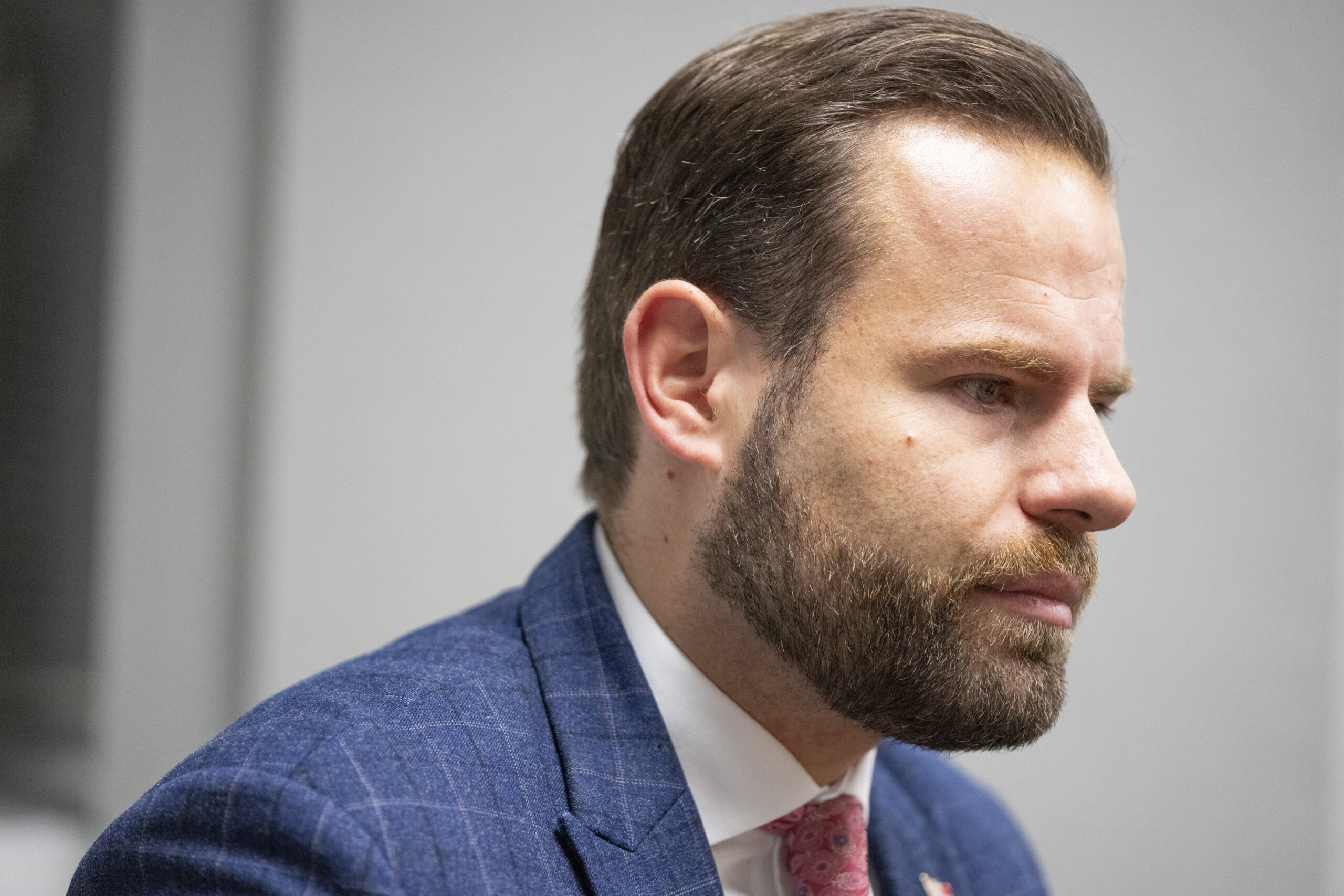
Piccini fell in love with Ottawa. He worked at an Italian grocer in the ByWard Market, slicing deli meats steps away from the House of Commons — even after entering politics, he would help out on weekends and holidays. While in school, he also worked at Agriculture Canada and Service Canada, before wading into party politics in 2011. That year, after graduating university, he became executive assistant to Conservative MP Ed Fast, then the international trade minister.
Piccini’s main role was to make sure everything was organized — that Fast’s speeches were ready, that the minister made it to question period on time and that everything was on track.
“He was my choice. I don’t think I went wrong there,” Fast says. “He was like a sponge, in the sense that he was constantly asking questions and wanting to know more about politics, know more about the development of policy.”
At the time, Fast says, his office put heavy emphasis on maintaining lines of communication with key stakeholders, like industry groups. “I have to think that David would have picked up on that, and absorbed the importance of stakeholder management and outreach. And he has the personality that would beautifully dovetail into that kind of an approach.”
In 2015, Piccini took a job with the Royal College of Physicians and Surgeons of Canada, where he led trade missions in the Middle East, Asia and Africa. The same year, he made his first attempt to land a seat, running federally in Ottawa—Vanier.
“He worked the community really hard,” says Jacquie LaRocque, founder and principal at the public affairs firm Compass Rose, who has a background in Liberal politics and lives in Ottawa—Vanier. “He treated people across the aisle very well … He’s a skilled public speaker in the sense that he’s calm and he’s quick on his feet.”
The riding had been held by an incumbent Liberal for 20 years, and was seen as nearly impossible to win. And indeed, Piccini lost. “In some ways, he was sort of a sacrificial lamb,” Fast says. “He did it with great energy, great enthusiasm.”
After moving back to his hometown and winning the provincial seat in the 2018 election, the rookie MPP brought the same zeal to his new job. His first position was as parliamentary assistant to the minister of colleges and universities. It wasn’t without difficulties. Piccini was at the microphone to help introduce controversial changes to the Ontario Student Assistance Program, which provides financial aid for Ontarians hoping to attend post-secondary school.
He was also in a harsh spotlight in 2020, when the Ford government announced its plan to grant university status to a Christian college run by evangelical preacher Charles McVety, who has made homophobic and Islamophobic statements, claimed the Earth is only 6,000 years old and said carbon pricing would “fund the one world government of the Anti-Christ.” Piccini defended the move publicly in both media interviews and question period. (In the end, the province deferred to the independent board that assesses post-secondary institutions, which denied the college university status.)
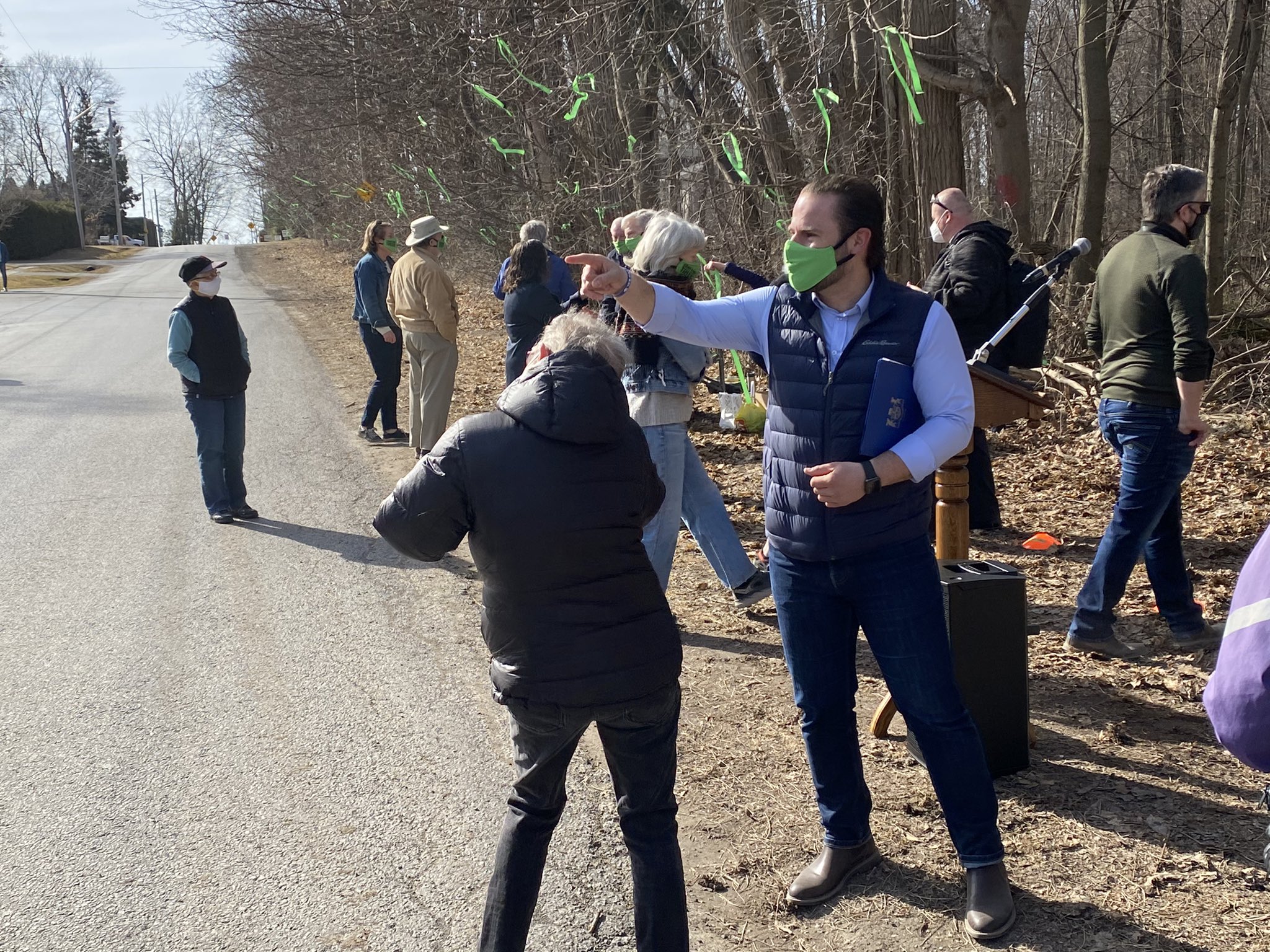
The MPP started to take a public interest in environmentalism in spring 2021, when he joined the fight to save a woodlot in Port Hope that is slated to be cut down for residential development. “Do we want to continue on a suburban trajectory to become one giant suburb of Toronto, or do we stand up and say no?” he said at a press conference organized alongside local grassroots group PHorests 4 R PHuture. Saying that he had played in the lot as a child, Piccini also launched a website, saveourtrees.ca, to rally support.
“It is personal to him, and that did come across,” says Claire Holloway Wadhwani, a member of the PHorests 4 R PHuture board of directors. While communication has been less frequent in recent months, Wadhwani says, Piccini’s office told the group he’s still supportive of its efforts. At press time, the development appeared slated to go ahead.
Wadhwani says she doesn’t generally agree with the Progressive Conservatives’ approach to the environment, but Piccini’s work on the woodlot struck a chord. “When he speaks about the importance of that ecosystem and that part of our tree canopy, I see alignment. I would be quite pleased to see that approach and that kind of perspective more reflected in the work of the Ministry of the Environment more broadly,” she says.
In June, soon after joining the woodlot fight, Piccini was promoted to his cabinet role. “I was really excited,” he says. “From my perspective, it touches so many things. You’ve got a short runway. How do you deal with it?”
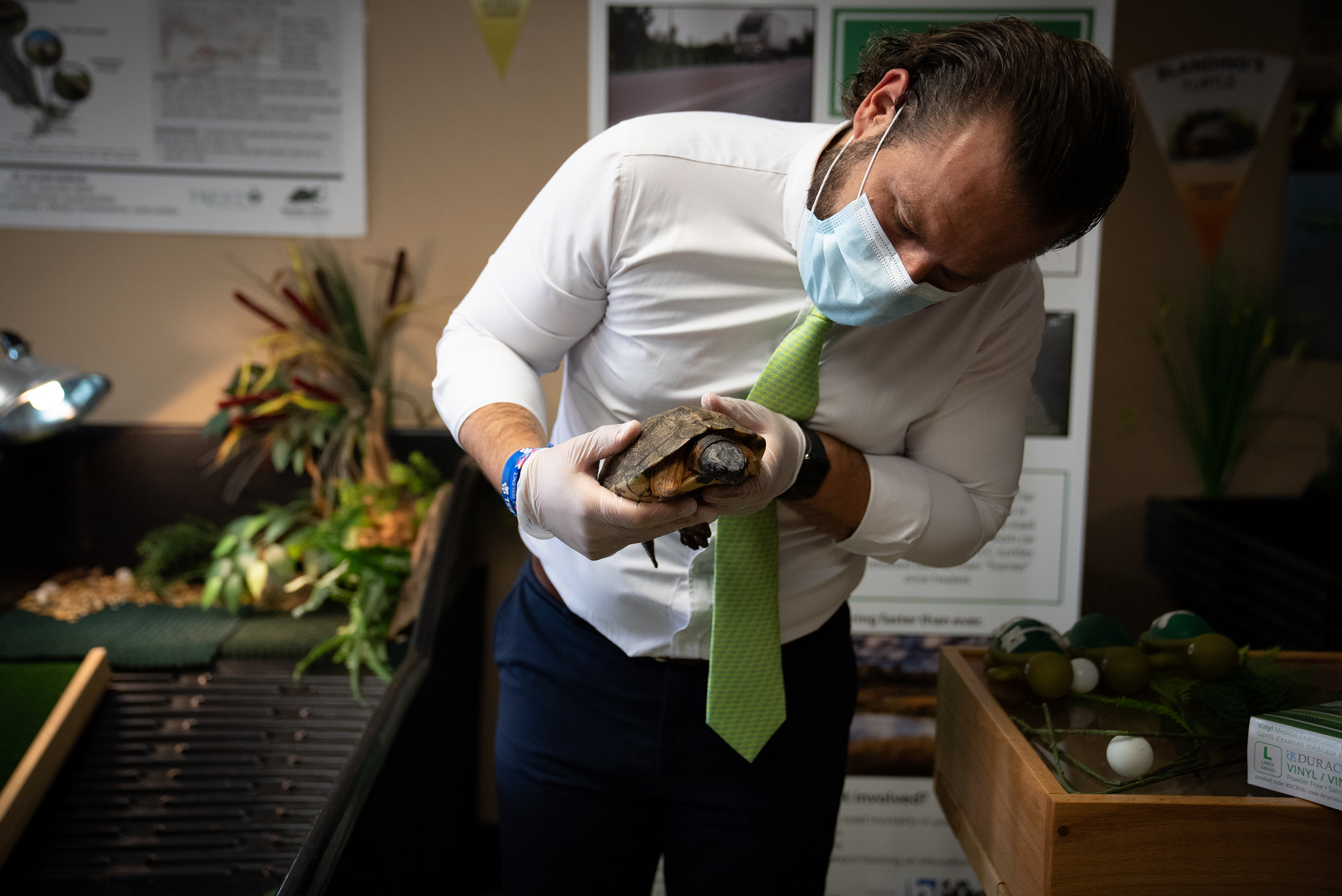
Piccini is more of an outdoorsman than an environmentalist. He and his dog Max, a gentle Nova Scotia duck toller and a constant companion in meetings and interviews, spend their weekends on Ganaraska Region Conservation Authority trails. His favourite provincial park is Killarney, a vast wilderness area along Lake Huron: his parents gifted him a painting of it, which hangs on the wall in his office. His favourite endangered species in Ontario is the Blanding’s turtle, which has a distinct yellow throat — “I honk for the turtles,” he exclaims.
He’s thrown himself into his new role with zest, visiting more than a dozen provincial parks since becoming minister (his best guess is 17) and pairing Birkenstocks with a Greenbelt T-shirt for a vaccine appointment photo-op. His proudest achievement as minister, he says, was adding a beloved Lake Erie beach to Turkey Point Provincial Park after the property went up for sale.
“We want to leave a better planet for future generations,” says Piccini, who announced his engagement to his fiancée in June. “Thinking about family, I don’t know if that changes one’s perspective. But you start thinking about what you want to leave behind.”
Under previous environment ministers Rod Phillips and Jeff Yurek, the Ford government made sweeping and broadly unpopular changes to the environment file, axing clean energy programs, rewriting environmental rules in ways critics say favour industry and dismantling the cap-and-trade program. Both Phillips and Yurek faced a near-constant barrage of criticism. It wasn’t long before Piccini began fielding the same.
Most recently, he was the one to respond to a nearly 500-page tongue-lashing from Ontario’s auditor general, who critiqued the government’s lack of progress on its climate goals, as well as its weak system for monitoring hazardous spills and rapidly-filling garbage dumps, among other things. The report even questioned whether the Environment Ministry was fulfilling its basic mandate to protect the environment.
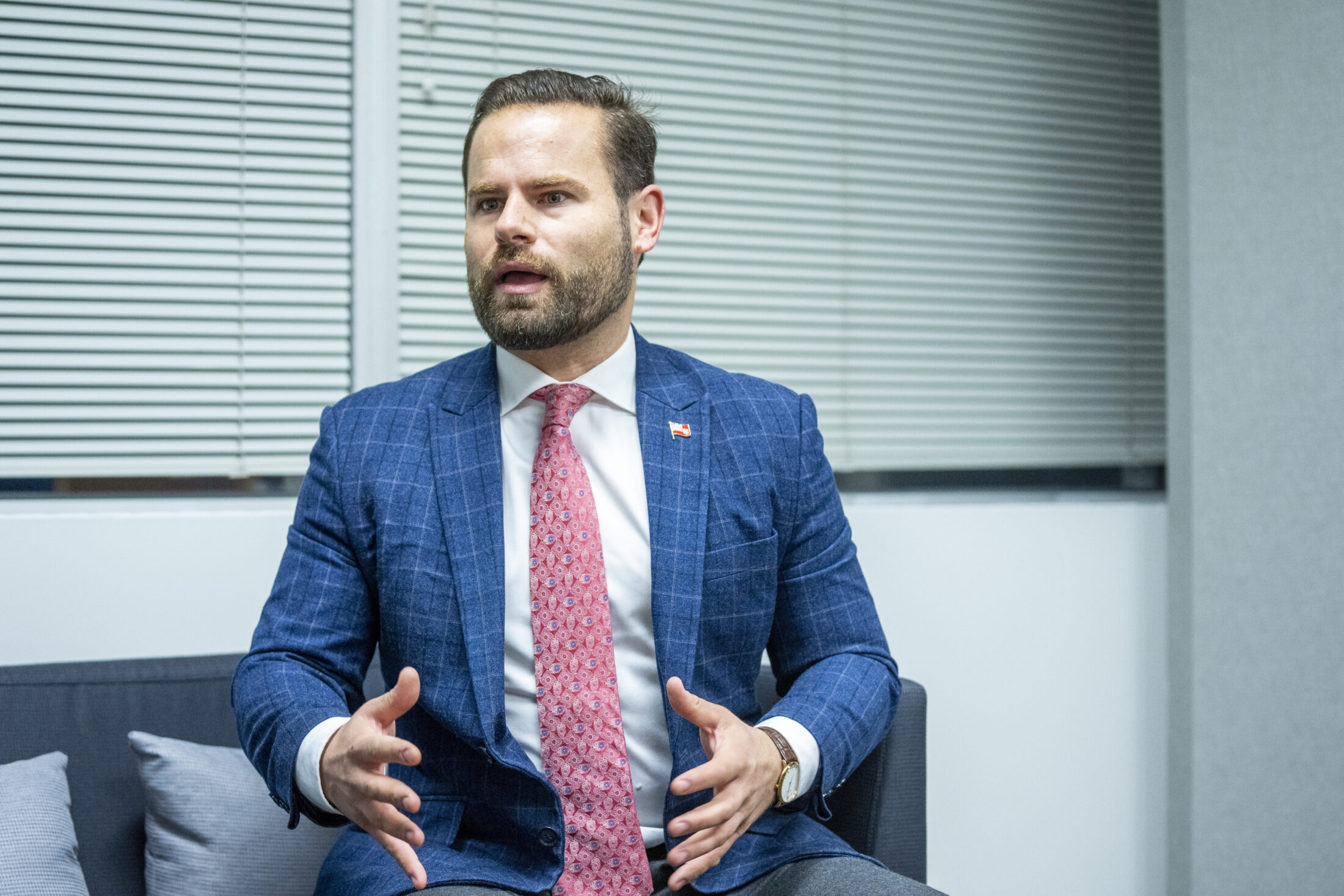
“He has a very hard job. I can’t imagine being a person trying to defend the Ford government’s environmental record,” Ontario Green Party Mike Schreiner says. “But so far in the Legislature, he seems to be relishing the challenge … he doesn’t pull any punches firing back.”
Piccini represented Ontario at the COP26 climate conference in the fall, but kept a low profile. Some members of the Canadian delegation told The Narwhal that they never saw him in Glasgow.
Upon his return home, critics questioned exactly what he had been doing. “We heard nothing from the minister about the conference or the work he did over there,” Ontario Liberal environment critic Lucille Collard said during question period. “Climate change conferences are not paid vacations.”
Piccini says he was busy in private meetings and conversations, including a “great chat” with former U.S. vice president Al Gore about politics, Ontario’s provincial parks and hydrogen energy. He also met with officials from other countries to share ideas, learning about German technology that could reduce road salt pollution, which can run into waterways and harm wildlife.
“Tweets will not define what I did at COP, action will,” Piccini says. “Ontario’s at the table, and I think we’ll all benefit.”
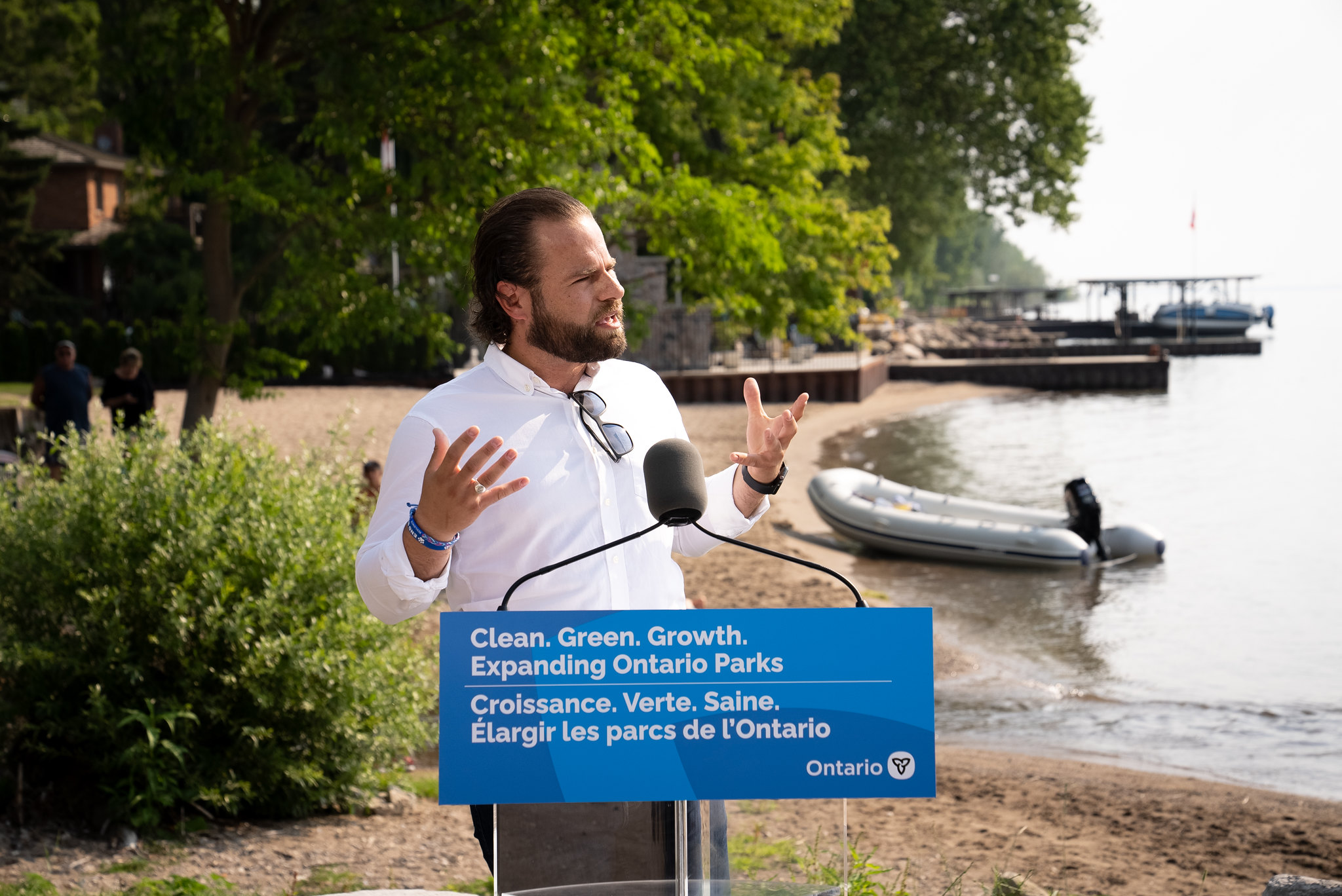
At the same time, Piccini stands by the Ford government’s heavily-criticized approach to development, which the province has sped up using special zoning orders that often override environmental concerns.“ Our record speaks for itself in facts in terms of what we’re doing,” he says. He also defends his government’s plans to fast-track two highways through Ontario’s Greenbelt, which critics say would tear up green space and set the stage for emissions increases.
“To just say we’re never going to build roads again, I mean, what a cop out,” he says. “Let’s build it, but let’s work with the pavement industry, excavating. Let’s look at adding renewables. I don’t think you can look at the environment in isolation.”
It’s not clear whether Piccini’s approach will bear fruit, or whether it will do so quickly enough. In November 2021, Ontario’s auditor general found the Ford government is on track to deliver just a fifth of the emissions reductions it promised in its climate plan.
Piccini says those projections, taken from the government’s internal estimates, don’t account for everything the province has done, including the $61.6 billion it committed this fall to funding transit, like subways, GO trains and light-rail projects, over the next decade. After publication, Piccini’s office said it has also taken further action since the report was finalized, like the electrification of Algoma Steel, which would take the equivalent of 300,000 cars off the road per year. His office also pointed the advancement of zero-emissions nuclear small modular reactors and work on a low-carbon hydrogen strategy.
Piccini didn’t directly answer when asked whether an updated version of the climate plan would be published before the election.
“Clean green growth is my focus,” he says.
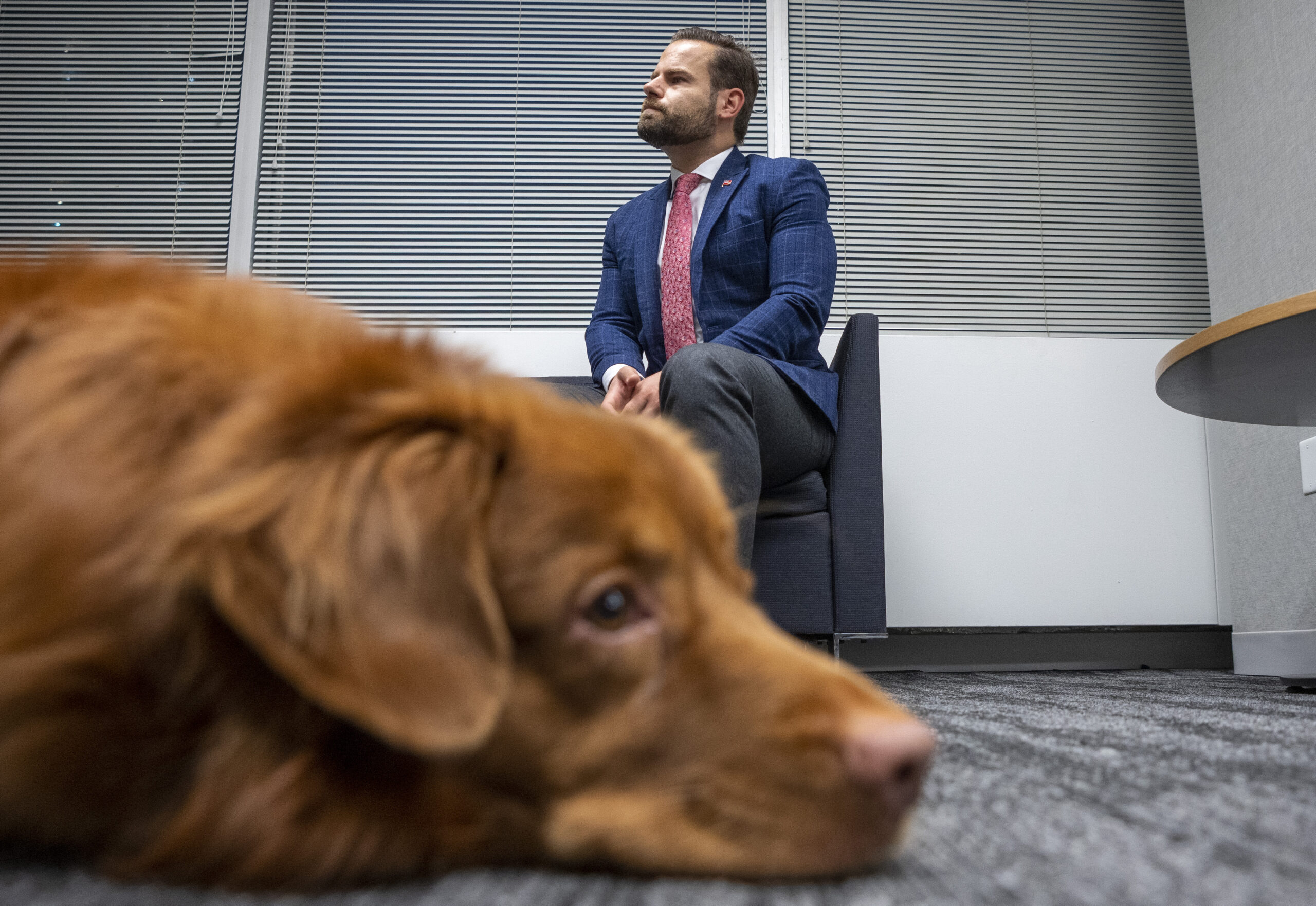
Piccini lists a few areas where he believes the province is making progress. Despite his reluctance to infringe on industry, his ministry has proposed regulations to crack down on sulphur dioxide emissions from petroleum refineries by 90 per cent by 2026. He’s also concerned with the lack of clean water in many Indigenous communities, an issue he says keeps him up at night.
It’s technically an area of federal responsibility, but one where Ontario is capable of lending a hand. The Ontario Clean Water Agency reports to Piccini and the provincial auditor general recently recommended that it focus less on revenue and instead help First Nations access safe drinking water at a lower cost. Piccini says he’s mandated the agency to include Indigenous perspectives in its decision-making process and form an Indigenous advisory circle.
“I could say, you know, these are federal problems, federal dollars, and it’s not under Ontario,” he says. “That’s passing the buck.”
Piccini has been talking about boil water advisories with NDP Indigenous and treaty relations critic Sol Mamakwa. “Will the story ever be written about that?” Piccini says. “Probably not because people aren’t interested in that sort of collaborative stuff.”
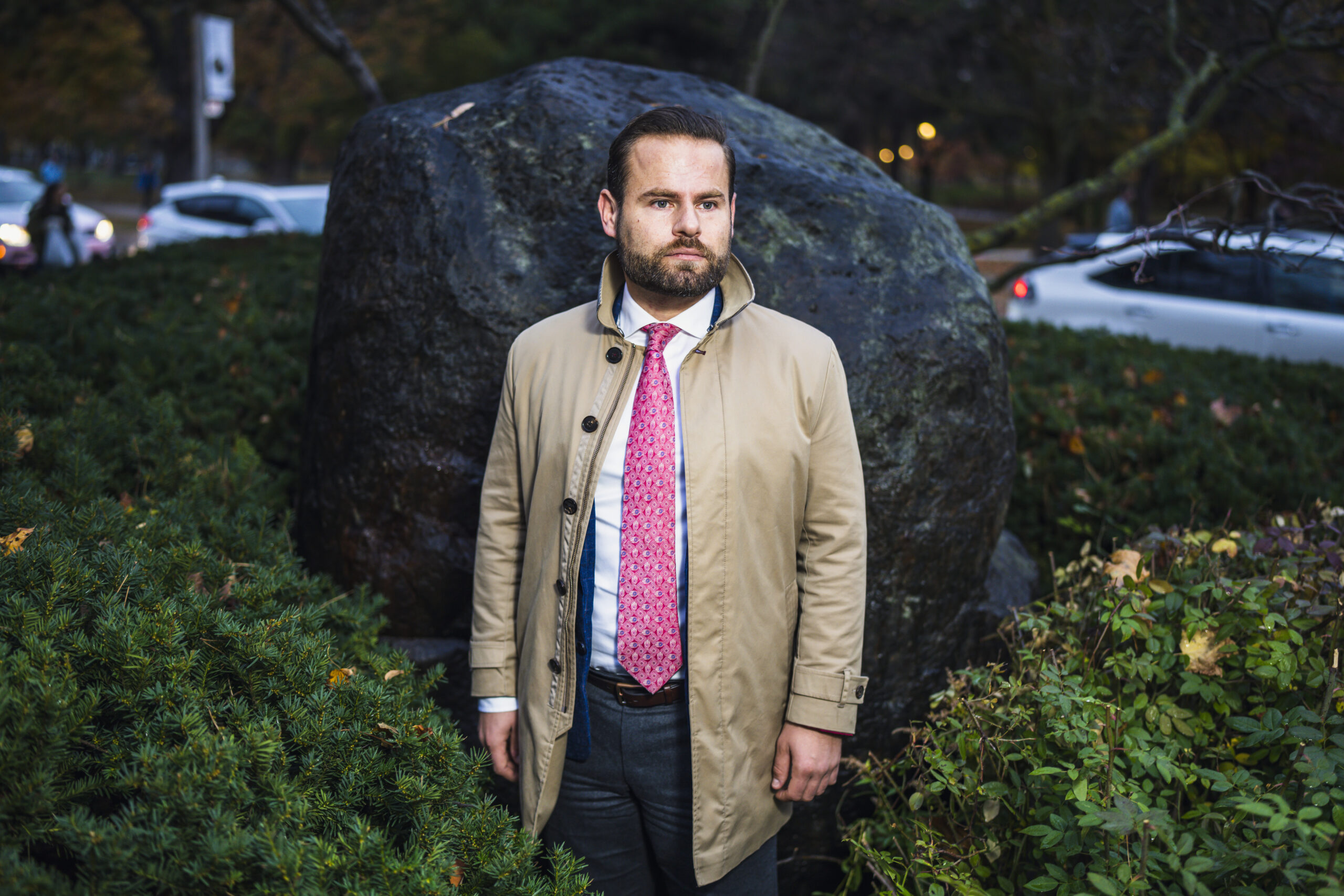
Mamakwa is from Kingfisher Lake First Nation and represents the far northwestern Ontario riding of Kiiwetinoong. While he says Piccini has had good answers for him on the clean water issue, Mamakwa isn’t sure what the minister’s enthusiasm means when the Ford government has had three and a half years to address the problem. Although Piccini isn’t responsible for the government’s entire catalogue of decisions, he has voted with his party along the way, Mamakwa says.
“There are things that he can’t do or he won’t do,” Mamakwa says. “Piccini says good things, but he’s part of that whole … They’ve taught me that oppression and colonialism is alive and well.”
Piccini says he wants to keep meeting with people who disagree with him.
“I want to be challenged. I’m not going to be a better minister by surrounding myself with sycophants who believe everything I say and do,” he says.
“I’m willing to listen and talk about it. It’s a tough gig, and it’s a tough file, but it’s a generational one and it matters.”
With files from Fatima Syed
Updated Jan. 5, 2022 at 3:31 p.m. ET: This story was corrected to reflect that the school Piccini attended growing up is an independent non-denominational school with Anglican roots. It was also updated to add information from Piccini’s office about actions the Ontario government has taken to reduce emissions since the release of the auditor general’s report.
Get the inside scoop on The Narwhal’s environment and climate reporting by signing up for our free newsletter. When I visited my reserve, Moose Factory,...
Continue reading
An invasive pest threatens the survival of black ash trees — and the Mohawk art...

Xatśūll First Nation is challenging B.C.’s approval of Mount Polley mine’s tailings dam raising. Indigenous...

As the top candidates for Canada’s next prime minister promise swift, major expansions of mining...

